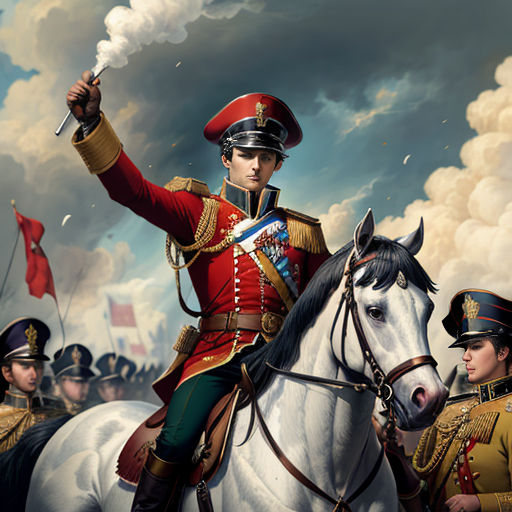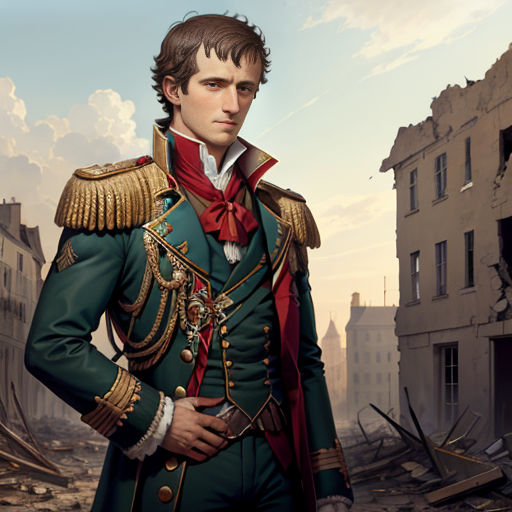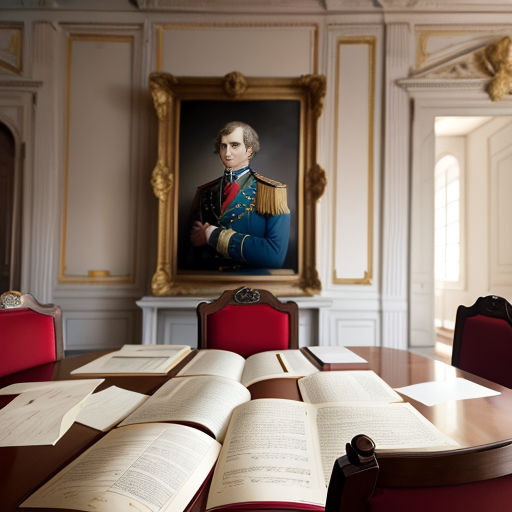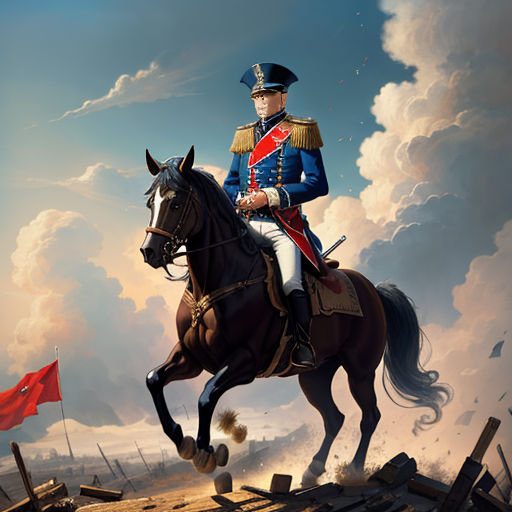
The Rise of Napoleon
By Storybird

15 Nov, 2023

Napoleon Bonaparte, a young Corsican artillery officer, was a man of ambition. His keen intellect and strategic acumen were already making ripples in the French military.

His rise began with the French Revolution, a time of chaos and opportunity. Napoleon's strategic brilliance in the Siege of Toulon led to his promotion as the commander of the French army.

Napoleon's military successes were not the only reason for his rise. His charisma and ability to inspire his troops played a significant role in his ascent to power.

In 1799, Napoleon seized control of the French government in a coup d'état, installing himself as the First Consul of France. His rule brought stability to the war-torn country.

In 1804, Napoleon crowned himself Emperor of the French, asserting his absolute power. His rule marked a new epoch in the history of France and Europe.

Napoleon introduced several reforms that modernized France. His Napoleonic Code laid the administrative and judicial foundations for much of Western Europe.

Napoleon's ambitions weren't limited to France. He set his sights on expanding his empire across Europe. His military campaigns, known as the Napoleonic Wars, changed the continent's landscape.

Napoleon's armies conquered vast territories, from Spain to Russia. His victory at Austerlitz is considered his greatest military achievement.

Despite his military genius, Napoleon's insatiable ambition led to his downfall. His disastrous invasion of Russia marked the beginning of the end of his reign.

After the catastrophic Russian campaign, many of Napoleon's allies turned against him. His once mighty empire began to crumble.

In 1814, Napoleon was defeated and exiled to the island of Elba. However, his indomitable spirit was not crushed. He escaped and returned to power in France for a brief period known as the Hundred Days.

Napoleon's final defeat at the Battle of Waterloo marked the end of his rule and the Napoleonic Wars. He was exiled again, this time to the remote island of Saint Helena.

On Saint Helena, Napoleon spent his final years reflecting on his life and writing his memoirs. Despite his downfall, he remained a symbol of revolution and national pride.

Napoleon Bonaparte, a man of humble origins, had risen to become one of the most powerful figures in history. His legacy, both as a reformer and a conqueror, continues to shape the world.

To some, Napoleon was a tyrant, a conqueror driven by insatiable ambition. To others, he was a visionary who modernized France and changed the course of European history.

Regardless of the various perspectives, there's no denying the impact of Napoleon's rule. His story is a testament to the power of ambition, intelligence, and strategic brilliance.

Napoleon's rise to power was not just a result of his military genius. His political acumen, charisma, and ability to inspire his troops played a significant role in his ascent.

Despite his downfall, Napoleon's influence did not end with his death. His ideas and reforms continued to impact France and Europe long after his reign.

Napoleon's rise and fall serve as a powerful reminder of the dual nature of power. It can create and destroy, inspire and terrorize, bring about great change and great suffering.

Napoleon Bonaparte's story is not just a tale of power and conquest. It's a story of human ambition, resilience, and the relentless pursuit of one's goals.

Napoleon's rise to power was as meteoric as his fall. Yet, his story continues to captivate us, reminding us of the heights one can reach and the depths one can fall to.

The story of Napoleon Bonaparte serves as a testament to the power of ambition and the human spirit. His rise and fall are a part of the historical fabric that continues to shape our world.

From a young Corsican artillery officer to the Emperor of the French, Napoleon's journey is a riveting tale of power, ambition, and resilience.

Napoleon's life is a testament to the fact that history is not merely a series of events, but a complex tapestry woven by individuals driven by their ambitions, dreams, and desires.

The story of Napoleon Bonaparte is an enduring tale of ambition, power, and the indomitable human spirit. His rise and fall continue to fascinate and inspire, reminding us of the dual nature of power.

Napoleon's life serves as a powerful reminder of the heights one can reach and the depths one can fall to. His story continues to resonate, reminding us of the potential and peril of ambition.

Napoleon Bonaparte's rise and fall is a tale that transcends time. His story is a testament to the human spirit's capacity for greatness and the consequences of unchecked ambition.

Even in his final exile, Napoleon remained a symbol of revolution and national pride. His legacy, both as a reformer and a conqueror, continues to shape the world.

The story of Napoleon Bonaparte is a powerful reminder of the duality of power. It is a tale that continues to captivate us, inspiring awe and serving as a cautionary tale.

Napoleon's tale is a riveting narrative of ambition, power, and resilience. It's a story that continues to resonate, reminding us of the potential and peril of ambition.

From a young artillery officer to the Emperor of the French, Napoleon's story is a testament to the power of ambition and the human spirit. His legacy continues to impact our world.

Napoleon Bonaparte's rise and fall is a story that continues to captivate us. It serves as a powerful reminder of the heights one can reach and the depths one can fall to.

Napoleon's life is a powerful testament to the dual nature of power. His rise and fall serve as a reminder of the potential and peril of unchecked ambition.

Napoleon Bonaparte, a man of humble origins, rose to the pinnacle of power and fell from grace. His story is a testament to the power of ambition, resilience, and the human spirit.

The story of Napoleon Bonaparte serves as a potent reminder of the dual nature of power. His meteoric rise and subsequent fall continue to captivate us, resonating with the human experience.